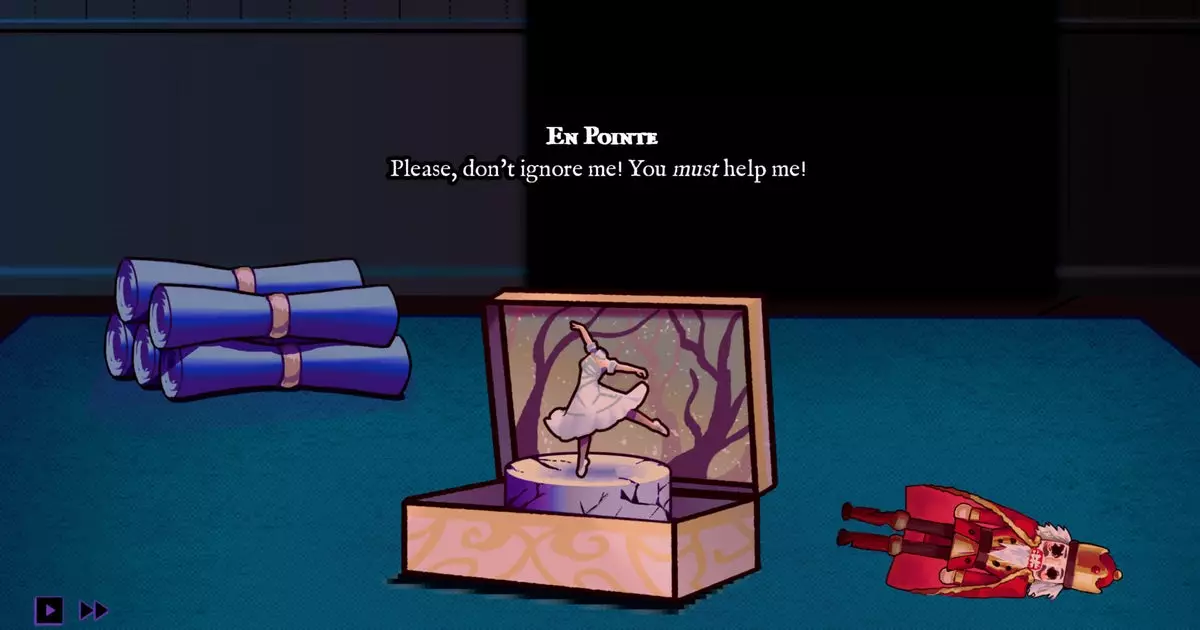At a glance, “Toy Box” appears to be holiday-themed, sporting a whimsical title that evokes thoughts of cheer and festivity. However, as one delves deeper by watching the trailer, it quickly becomes apparent that it strays far from the traditional Christmas narrative. Instead, it transforms into an engaging visual novel entwined with dark themes and an unsettling ambiance. The game is a creation of DEADline Studios, a distinctive small group known for their diverse backgrounds and their aim to explore the complexities of the human experience through unconventional storytelling.
In the world of “Toy Box,” players assume the role of a toy inspector charged with a rather peculiar task: dismantling toys that appear to embody both innocence and malevolence. Guided by the enigmatic Grand Toy Maker—whose visage remains tantalizingly hidden—players must navigate choices that reflect their morality. Engaging with five toys, players are met with instructions that might as well be cryptic riddles. Each toy is not merely an object; they pulsate with life, sharing their narratives and lamenting their fate as they face disassembly. The choice of whether to “salvage” or “sentence” these seemingly sentient creations to the flames creates an ethical dilemma that underscores the core of the gameplay.
What makes “Toy Box” particularly compelling is the juxtaposition between the charming aesthetic of toys and the grim reality underlying them. As players interact with the toys, they soon discover that these animated figures aren’t the harmless entities one might expect. Instead, they introduce themes of suffering, darkness, and horror, invoking a sense of dread reminiscent of classic horror tales. The toys, with their glowing eyes and macabre narratives, paint a picture of innocence corrupted—a notion with roots in folklore that often blurs the line between trust and fear.
Integral to the narrative is the Grand Toy Maker, an increasingly haunting presence who evaluates the player’s decisions throughout the game. His character serves as a reminder of the consequences of one’s choices, bridging the gap between player and creator. The unsettling notion that inspectors must uphold the Maker’s image places a moral burden squarely on the player’s shoulders. This relationship mirrors real-life complexities in industries where ethics can often be compromised for the sake of success—an allegory for the sacrifices made in pursuit of a more considerable good.
The game’s content warnings deserve significant attention. While devoid of explicit sexual content, it doesn’t skimp on graphic elements that can trigger discomfort. Themes of violence, body horror, and psychological unease create an atmosphere that is gripping yet often too intense for sensitive players. Yet, it’s this discomfort that acts as a catalyst for profound engagement with the narrative. It encourages players to confront their own moral beliefs and the darker sides of humanity often hidden under the guise of innocence.
One can’t help but marvel at the innovative concept of storytelling through the act of dismantling. This gameplay mechanic offers a unique lens to explore the narratives embedded within physical objects. While “Toy Box” leans heavily toward horror, the fundamental idea of examining stories through manipulation and disassembly invites a wealth of possibilities. It aligns with other experimental games, such as “Hardspace: Shipbreaker,” where deconstruction is a form of interaction with the narrative. This mechanism presents a creative avenue for exploring stories without necessarily resorting to horror—a concept that deserves broader exploration in the gaming landscape.
“Toy Box” is not merely a game about whimsical toys; it is a profound exploration of human complexity amidst a backdrop of horror and moral quandaries. It invites players to navigate the disquieting intersections of innocence and malevolence, all while challenging their ethical compass. While it may not appeal to everyone due to its disturbing content, its unique storytelling approach and the backward glance into the human psyche create a distinct experience that is thought-provoking and timely. As we venture deeper into the realm of gaming, stories like those presented in “Toy Box” demand attention, beckoning players to confront the darker, often ignored aspects of humanity while engaging with the existence of the uncanny.


Leave a Reply
You must be logged in to post a comment.